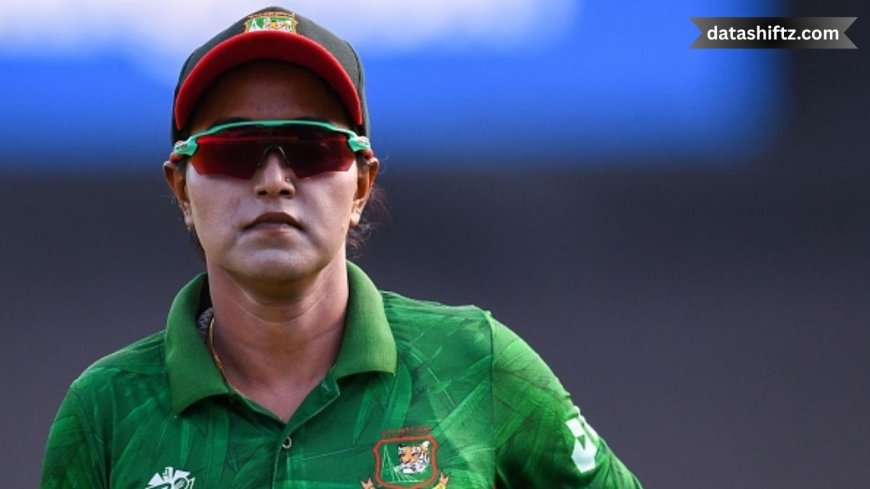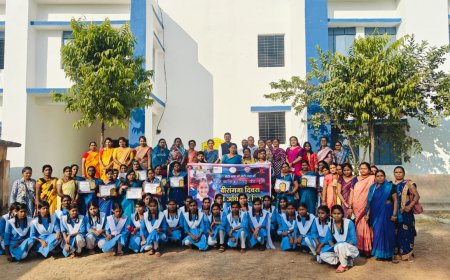Nigar Sultana: The Cricketer Who Wears the Gloves and the Crown

Nigar Sultana Joty is a name that resonates in modern women’s cricket in Bangladesh. As a wicket‑keeper, a middle‑order batter, and captain of her national side, she embodies leadership, persistence, and excellence. Her journey from a young cricket aspirant to a national captain is inspiring — a story of grit, skill, and ambition.
Early Life and Rise to Prominence
Nigar Sultana was born on 1 August 1997 in Sherpur District, Bangladesh. She developed a love for cricket at a young age and gradually found her place in domestic cricket before representing her country on the international stage.
She made her WODI debut on 6 October 2015 against Pakistan, and her WT20I debut followed shortly after on 30 September 2015 — also versus Pakistan. Over time, she solidified her position as a core player in both formats.
By 2024, she had become not only a regular in the Bangladesh women’s side, but also its captain in both One Day Internationals and T20 Internationals. Her captaincy, batting, and wicketkeeping have all garnered praise from fans, critics, and teammates alike.
Performance, Records, and Role
Key Attributes
-
She is right‑handed with the bat, and serves as the team’s wicketkeeper.
-
She bats in the middle order, and under pressure situations she has often risen to the occasion.
-
As captain, she leads by example, both in the field and with the gloves.
Statistical Snapshot
Below is a comparative table summarizing her performance in the two international formats (WODI and WT20I) up to 2024:
| Format | Matches | Runs Scored | Batting Average | Highest Score | 100s / 50s | Catches / Stumpings |
|---|---|---|---|---|---|---|
| WODI | 47 | 897 | 23.60 | 73 | 0 / 5 | 26 / 16 |
| WT20I | 103 | 2,048 | 27.30 | 113* | 1 / 8 | 22 / 46 |
These numbers reflect both her batting contributions and her work behind the stumps. Her T20I century (113*) is a standout performance, especially for a wicketkeeper‑batter.
Milestones, Leadership & Highlights
Nigar Sultana’s cricketing journey has seen several defining moments. Here are some of the highlights:
-
Asia Cup Success (2018): She was part of the Bangladesh team that won their first Women’s Asia Cup title.
-
Leading Bangladesh: She was chosen as captain for major tournaments such as the Women’s World Cup Qualifier and the Commonwealth Games Qualifiers.
-
T20 World Cup 2024 Achievement: In the 2024 ICC Women’s T20 World Cup, she played her 100th T20I match (3 October 2024) — the first Bangladeshi woman to reach that milestone.
-
Outstanding Keeping: In the same World Cup, her contributions behind the stumps were remarkable — she made six stumpings and one catch, the most dismissals by any wicketkeeper in the tournament.
-
Iconic Partnerships: She once held a record for the highest third‑wicket partnership in Women’s T20Is with Fargana Hoque (236*).
Through these achievements, Nigar has become not only a statistical achiever but also a role model for aspiring women cricketers in Bangladesh and beyond.
Challenges & Inspirations
No journey to the top is without hurdles. Nigar has had to balance expectations, leadership pressures, and performance demands. At times, Bangladesh has been termed an underdog in women’s cricket, and as captain, Nigar has had to uplift team morale, strategize against stronger opponents, and manage her own form.
Yet, what makes her story compelling is how she uses challenges as fuel. She has often spoken about inspiring families and parents to support girls in cricket — breaking social barriers and encouraging equality in sport.
Her leadership style is rooted in leading by action — playing defensively when needed, accelerating when required, and staying calm in tense situations.
A Note on the Actress Nigar Sultana (for Contrast)
While this article is primarily about the cricketer, it’s worth noting that Nigar Sultana was also a classic Indian film actress (1932–2000). She is most remembered for her role as Bahar Begum in the epic film Mughal‑e‑Azam (1960) and appeared in many Hindi films from the late 1940s through the 1970s.
This dual existence of two prominent personalities with the same name often leads to confusion, but in their own fields, each Nigar Sultana left indelible marks — one in cinema, the other in sport.
Why Nigar Sultana Matters: A Reflection
Nigar Sultana’s importance transcends numbers. She symbolizes the evolving landscape of women’s sports in Bangladesh — a nation where cricket is passionately followed, yet women’s cricket is still building its legacy. As captain and wicketkeeper, she is a central figure in that evolution.
Here are some reasons why she stands out:
-
Leadership Under Pressure
Steering a national team in big tournaments demands strategic vision, mental strength, and communication. Nigar has displayed these traits consistently. -
Dual Role Utility
Wicketkeepers aren’t always leading batsmen, and batters don’t always keep. Nigar excels in both, giving the team balance and depth. -
Inspiring Next Generation
Her vocal support for girls pursuing cricket, and her own success, provide a living example for young players, especially from less privileged backgrounds. -
Breaking Stereotypes
In a society where women in sport still face scrutiny, her achievements reinforce that excellence knows no gender.
Summary
Nigar Sultana Joty is among the most influential cricketers in Bangladesh’s women’s team. Her journey — from making her international debut in 2015 to captaining the side and breaking records — is testimony to her dedication, talent, and leadership.
As she continues to lead and perform, one hopes she will guide Bangladesh toward more tournament success, higher rankings, and a stronger presence in global women’s cricket.
If you enjoyed this article, I can also write a biographical piece about the actress Nigar Sultana, or compare both personalities. Would you like me to do that next?
Conclusion: The Legacy of Nigar Sultana
Nigar Sultana Joty stands as a beacon of resilience, excellence, and ambition in Bangladesh cricket. From her early days in Sherpur to becoming the national captain, she has redefined what’s possible for women in sport in a country where opportunities have not always been equal.
Her journey is not just about personal achievements — it reflects the evolving story of women’s cricket in South Asia. As a wicketkeeper, batter, and leader, she has shown that with determination and skill, one can rise above barriers and lead a team to new heights.
Whether it's her record-setting performances, her calm yet assertive captaincy, or her role as a mentor and role model, Nigar continues to inspire countless young girls to pick up the bat and gloves. She is not just playing the game — she is changing it.



























